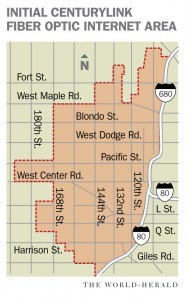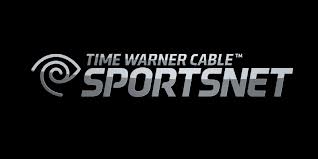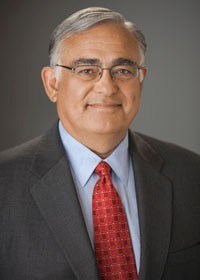
A freak spring snowstorm has stolen CenturyLink’s thunder.
A freak spring snowstorm has covered up much of the anticipated publicity for CenturyLink’s plans to launch a trial of gigabit fiber broadband for 48,000 customers in western Omaha.
The phone company announced the pilot project this week amid a historic spring storm that dumped several inches of heavy, wet snow on parts of Nebraska. The media devoted most of its attention to the weather.
CenturyLink admits its gigabit fiber service is a pilot project designed to test consumer demand and the tolerance of local officials for limiting upgrades to selected neighborhoods and customers most likely to buy the service. CenturyLink has priced the gigabit service comparably to Google Fiber — $79.95 a month if bundled with other CenturyLink products. Standalone broadband is nearly twice as expensive — $149.95 a month.
“CenturyLink is pleased to offer its Omaha customers ultra-fast broadband speeds up to 1Gbps to help keep pace with growing broadband demands,” said Karen Puckett, chief operating officer. “This demonstrates our commitment to deliver communications solutions that provide our customers with the technology they need to enhance their quality of life, now and into the future.”
CenturyLink will not be building the fiber network from scratch. The company already runs a 100Gbps middle-mile/institutional fiber network in Omaha that reaches certain business clients and serves as a conduit for CenturyLink customer traffic. CenturyLink will supplement that by using the remnants of its predecessor’s long-gone Qwest Choice TV service. The company will spend millions to run fiber connections to homes and businesses, but around 9,800 residents formerly served by Qwest’s television service will be able to sign up for CenturyLink Lightspeed Broadband as early as Monday. Others may have to wait until as late as October.
 CenturyLink now sells up to 40Mbps speeds in Omaha, with a 300GB monthly usage cap. The company has not said if it intends to apply a usage limit on its fiber customers.
CenturyLink now sells up to 40Mbps speeds in Omaha, with a 300GB monthly usage cap. The company has not said if it intends to apply a usage limit on its fiber customers.
The phone company’s largest and fastest competitor is Cox Cable, which sells up to 150/20Mbps service for $99.99 a month.
Cox Cable cannot match CenturyLink’s speeds at the moment, but does not think most Omaha residents need or want gigabit fiber.
“It is important to note that our most popular Internet package remains the one that provides speeds of 25Mbps, which meets the needs of the majority of customers,” said Cox spokesman Todd Smith. “We will continue to talk with our customers and invest in product enhancements to provide an optimal broadband experience.”
 Only around 12% of metropolitan Omaha will have access to the experimental fiber service, primarily those living in West Omaha. The network will bypass residents that live further east. The boundaries of the forthcoming fiber network are notable: West Omaha comprises mostly affluent middle and upper class professionals and is one of the wealthiest areas in the metropolitan region. Winning a right to offer service on a limited basis within Omaha is an important consideration for telecom companies like CenturyLink.
Only around 12% of metropolitan Omaha will have access to the experimental fiber service, primarily those living in West Omaha. The network will bypass residents that live further east. The boundaries of the forthcoming fiber network are notable: West Omaha comprises mostly affluent middle and upper class professionals and is one of the wealthiest areas in the metropolitan region. Winning a right to offer service on a limited basis within Omaha is an important consideration for telecom companies like CenturyLink.
AT&T, Verizon, CenturyLink and other telecommunications companies are seeking deregulation that would end universal service mandates that require companies to build their networks in every neighborhood, rich and poor.
Cable and telephone companies have taken careful note Google Fiber is being allowed to provide service only where demand can be found — a significant change in long-standing municipal policies that demand cable and phone companies provide access to nearly every resident.
CenturyLink delivered a “between the lines” message to local officials when it suggested it might expand its fiber network elsewhere in Omaha and beyond, but only after evaluating the project for “positive community support, competitive parity in the marketplace and the ability to earn a reasonable return on its investment.”
In other words, keeping zoning and permit battles (and residential complaints about construction projects) to a bare minimum, allowing the company the right to choose where it will (and won’t) deploy service, and making sure people will actually buy the service are all the key factors for fiber expansion.
AT&T said much the same thing when it vaguely promised a gigabit fiber network to compete with Google in Austin.
Google may have unintentionally handed their competitors a new carrot: deregulate us in return for fancy fiber upgrades that customers crave.

In perspective: CenturyLink’s fiber trial will only impact about 12% of the total population of metropolitan Omaha, primarily in and near affluent West Omaha.
[flv width=”480″ height=”290″]http://www.phillipdampier.com/video/WOWT Omaha CenturyLink Gigabit 5-1-13.flv[/flv]
WOWT in Omaha spent less than a minute reporting on CenturyLink’s forthcoming gigabit fiber trial. A spring snowstorm preoccupied most of Omaha’s media instead. (1 minute)
 Time Warner Cable’s decision to spend $11 billion to broadcast Los Angeles Lakers and Dodgers games at an estimated cost of $50-60 a year per subscriber is the subject of a class action lawsuit from fed up customers.
Time Warner Cable’s decision to spend $11 billion to broadcast Los Angeles Lakers and Dodgers games at an estimated cost of $50-60 a year per subscriber is the subject of a class action lawsuit from fed up customers.

 Subscribe
Subscribe

 In response to the deadly tornadoes in Moore, Okla., Cox Communications today said it would lift viewing restrictions for dozens of networks for Cox Cable customers who want to watch cable programming online using Wi-Fi or mobile broadband.
In response to the deadly tornadoes in Moore, Okla., Cox Communications today said it would lift viewing restrictions for dozens of networks for Cox Cable customers who want to watch cable programming online using Wi-Fi or mobile broadband. The Heeley family have been Cox customers for over 15 years, buying cable television, broadband, and phone service that costs them nearly $200 a month.
The Heeley family have been Cox customers for over 15 years, buying cable television, broadband, and phone service that costs them nearly $200 a month.
 CenturyLink now sells up to 40Mbps speeds in Omaha, with a 300GB monthly usage cap. The company has not said if it intends to apply a usage limit on its fiber customers.
CenturyLink now sells up to 40Mbps speeds in Omaha, with a 300GB monthly usage cap. The company has not said if it intends to apply a usage limit on its fiber customers. Only around 12% of metropolitan Omaha will have access to the experimental fiber service, primarily those living in West Omaha. The network will bypass residents that live further east. The boundaries of the forthcoming fiber network are notable: West Omaha comprises mostly affluent middle and upper class professionals and is one of the wealthiest areas in the metropolitan region. Winning a right to offer service on a limited basis within Omaha is an important consideration for telecom companies like CenturyLink.
Only around 12% of metropolitan Omaha will have access to the experimental fiber service, primarily those living in West Omaha. The network will bypass residents that live further east. The boundaries of the forthcoming fiber network are notable: West Omaha comprises mostly affluent middle and upper class professionals and is one of the wealthiest areas in the metropolitan region. Winning a right to offer service on a limited basis within Omaha is an important consideration for telecom companies like CenturyLink.
